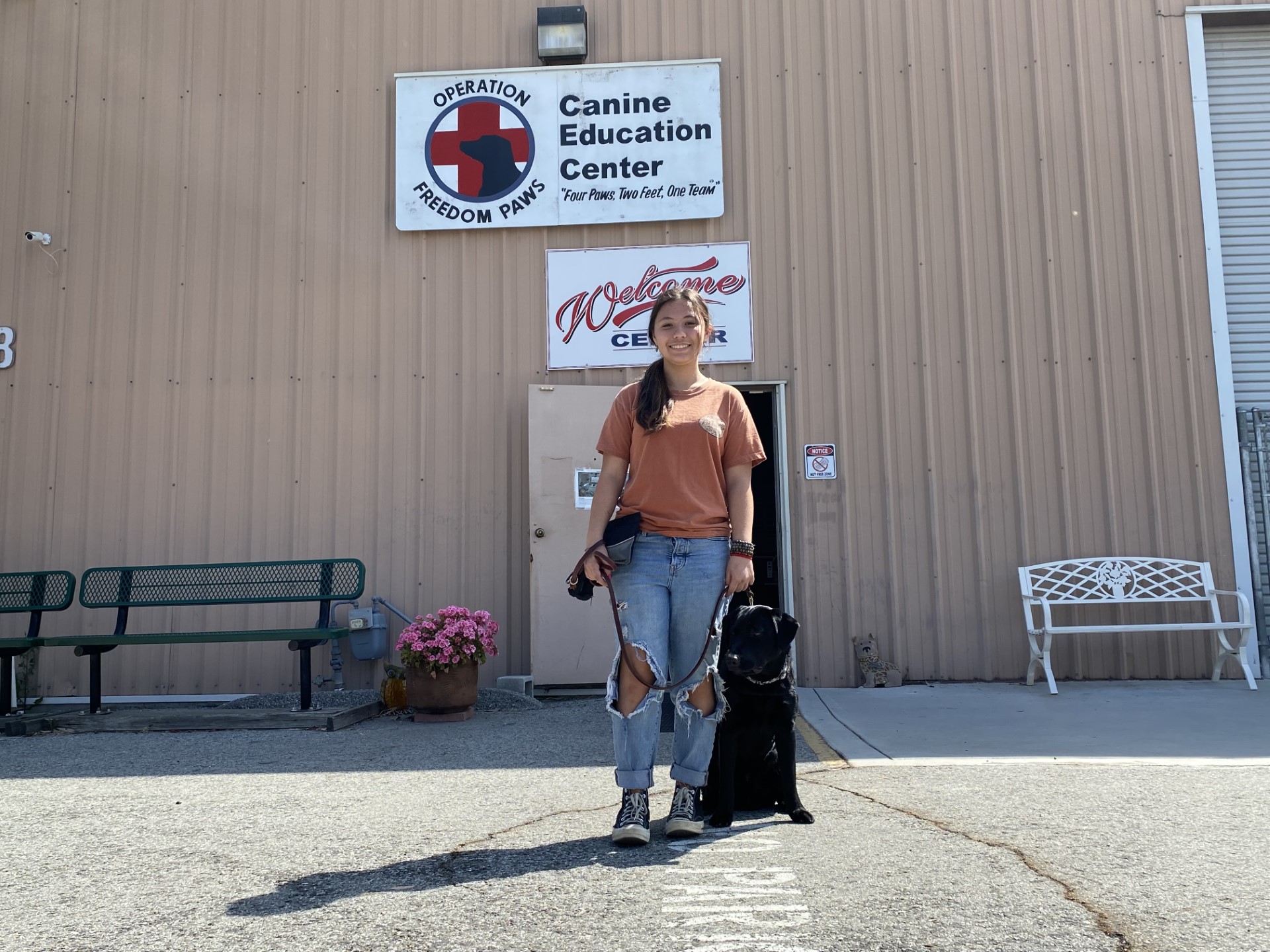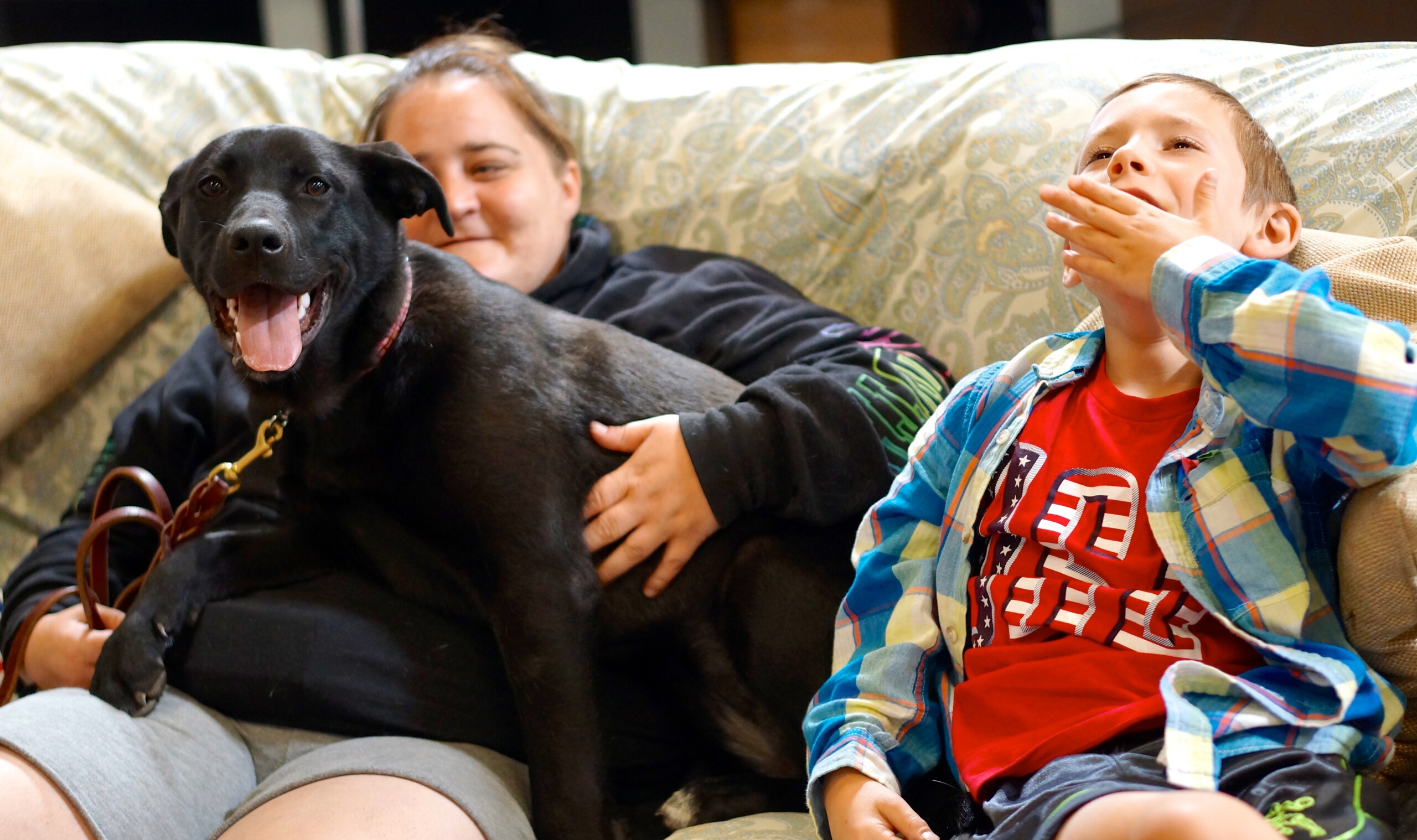Nonprofit profile: Young people helped with compassionate dogs at Operation Freedom Paws
17-year old girl with type 1 diabetes helped by lab puppy named Lewey
![]()

Photo by Nolan Lyle
Max Aujero with her service black lab puppy Lewey at Operation Freedom Paws’ headquarters where she trains Mondays and Saturdays.
By Nolan Lyle
Operation Freedom Paws is well known in South Valley for helping veterans by pairing them with canine friends. Its less known service is supporting young people by training them with compassionate dogs. One of them is a 17-year-old girl named Max Aujero who travels twice a week from Merced to the nonprofit’s base in San Martin.
 Aujero connected with the organization through her father who worked at Moffat Air Force Base where OFP held family day events. When she applied in late 2022, she was accepted. A couple weeks later she got her own service dog: a black lab puppy named Lewey.
Aujero connected with the organization through her father who worked at Moffat Air Force Base where OFP held family day events. When she applied in late 2022, she was accepted. A couple weeks later she got her own service dog: a black lab puppy named Lewey.
Aujero has type 1 diabetes, so Lewey sometimes will alert her when her blood sugar levels are changing. Humans have body chemistry, and a dog’s sense of smell is able to pick it up.
“When my blood sugar goes high or low, there’s a certain scent it gives off, and Lewey can smell that and alert me,” she said. “He’s a puppy still, so he’ll bite at my fingers or bite at my calves to alert me.”
Lewey is able to indicate 20-30 minutes before her monitoring equipment shows her level is changing. Not only does Lewey help Aujero with her diabetes, he also helps with her social anxiety.

Photo courtesy Connor Quinn
Female veteran Ashley with her service dog April she received from Operation Freedom Paws.
Without Lewey and the training the two receive from OFP, the girl’s life would be very different.
Operation Freedom Paws is a nonprofit organization that focuses on service dogs for veterans, first responders, children, and others. About 70 percent of their clients include veterans who experience illnesses such as PTSD or any battle-related injuries. The other 30 percent is made up of first responders and children in need. As funds permit, OFP allows others who don’t fit into any of those categories to be matched with a service dog.
OFP began in 2010 when the founder, Mary Cortani, received a call from a suicidal veteran. The marine had been on a waiting list from a traditional service dog organization for several years with no luck. A U.S. Army veteran, she and the marine discussed his crisis, eventually resulting in a promise made by Cortani that if he was willing to take a chance with her, she would help him train a service dog.
“At first, I did not know what post-traumatic stress was,” she said. “I didn’t understand the issues veterans were facing, let alone the challenges in the service dog industry.”
She did research and found the skillsets needed, eventually providing help to the marine to train his own service dog. That’s how OFP began. In September 2011, Cortani made Operation Freedom Paws a nonprofit organization. Now, 13 ½ years later, OFP has helped and assisted 519 veterans — and at no charge to them.
The “others” OFP helps include young people. Anytime a child comes in who is younger than 17 or 18 (age 12 is the youngest OFP accepts), they have to understand the commitment. They need to spend a lot of time with the dog because the animal is going to be with them all the time.
 Aujero comes to OFP Mondays (for two hours) and Saturdays (for three hours) to train with Lewey. She and her parents make the trip from their home in Merced where the girl is a junior in high school. Lewey is almost nine months old and has two brothers named Hewey and Dewey, honoring the ducks from Disney’s animation. Dewey is also in the program.
Aujero comes to OFP Mondays (for two hours) and Saturdays (for three hours) to train with Lewey. She and her parents make the trip from their home in Merced where the girl is a junior in high school. Lewey is almost nine months old and has two brothers named Hewey and Dewey, honoring the ducks from Disney’s animation. Dewey is also in the program.
Aujero and Lewey train to build obedience. Commands include “sit” and “stay” and more advanced actions like “side post” when she wants the dog to be by her side. Aujero is one of the youngest clients. A young boy came to train at the San Martin site, and they met and became friends. It helps her to connect with other young people and know she is not alone.
“Operation Freedom Paws changes lives. Without Lewey I would be very different for sure,” Aujero said.
The dogs come from shelters and rescues. (Cortani doesn’t do owner “surrenders.”) The dogs in the shelters need help too, she believes. Pairing service dogs with people in need is a specific task, and Cortani is exceptional at it. As one of Cortani’s coworkers commented, “It’s Mary’s Alchemy.”
Cortani believes every person is a unique individual and when she gets to know them, she begins to understand who they are. Every dog is also different. No two have the exact same personality.
 “You get the dog you need, not the dog you want,” she said. “All our veterans and first responders, they want a big, bad, scary dog to keep people away — and that’s not what they need.”
“You get the dog you need, not the dog you want,” she said. “All our veterans and first responders, they want a big, bad, scary dog to keep people away — and that’s not what they need.”
If a client is anxious, if they’re having a panic attack, if they’re hypervigilant, those things affect their energy, and the dog is sensitive to that, she said. Cortani looks at 30 different things when picking the right service dog, because not every dog can be a service dog.
“So, you don’t want to take a dog that’s extremely active, high drive and pair it with somebody like that,” she said. “You want to tone it down because the dog’s role is to bring that person down and have them be a little bit more balanced.”
OFP gives no-cost presentations at schools and organizations to educate children about service dogs and disabilities and explain to them how dogs can help anyone.
“We teach the proper behavior to interact with a service dog, and not to be offended by the handler saying, ‘No, not right now,’” Cortani said. “You don’t know what or where they’re at in that particular moment.”
Cortani wrote the book “Four Paws, Two Feet, One Team” for children 5 to 8 years of age. OFP also works with schools their younger clients attend, so they are able to bring their dog into that environment.
“We help them with their policies and how to handle if the dog might be jumping up or give a bark or a whine. It doesn’t mean the dog is misbehaving. It means something’s going on with the child,” Cortani said.
As a nonprofit, OFP needs to do a lot of fundraising. Besides donations and grants, funding comes from dog training for the public as well as daycare and boarding of dog pets. They also hold fundraising events throughout the year such as a golf tournament in May, bowling tournaments, and a gala in August that’s held on their grounds.
From military veterans to first responders to young people like Max Aujero, Operation Freedom Paws changes and saves lives one team at a time.
“My favorite part is watching and celebrating,” Cortani said. “It’s really celebrating the success of our clients because as human beings, we don’t stop and celebrate the little things.”
Morgan Hill resident Nolan Lyle is an eighth grade student at Charter School of Morgan Hill. He wrote this story with assistance from publisher Marty Cheek.
